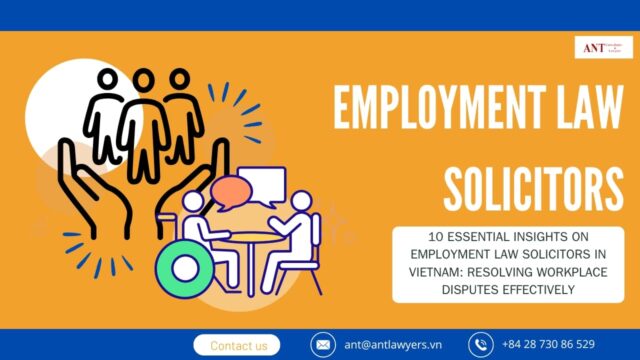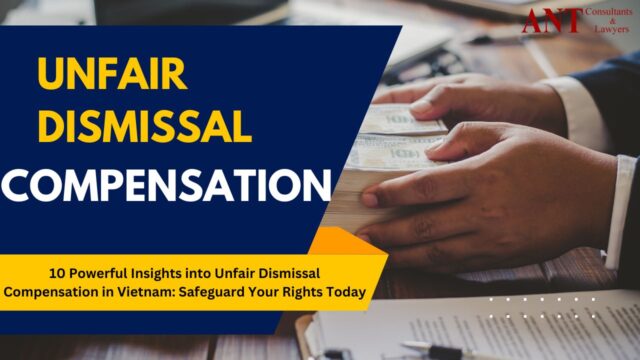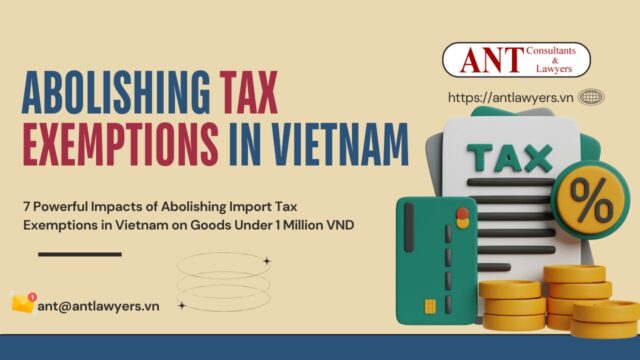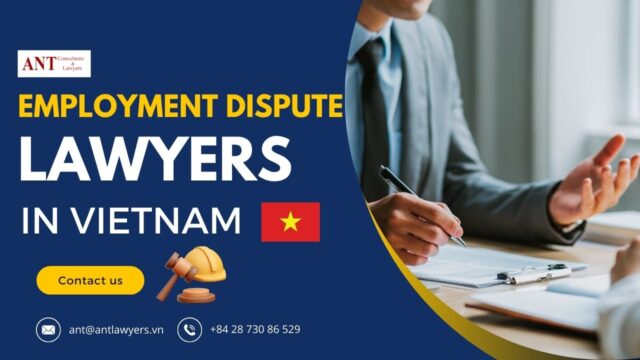Complying with employment law in Vietnam can be a challenging for both employers and employees, particularly when conflicts arise due to the involvement of personal emotions. There are many possibilities that actions taken when people are not in best shape of minds could result in unrepeatable relationship or leading to potential disputes not being resolved the most effective ways.

Disputes over contract terms, unfair dismissal, wage issues, or workplace harassment are not uncommon, and they can lead to significant stress and financial loss if not handled properly.
Understanding the legal framework governing these issues is crucial for ensuring fair treatment and compliance with the labour law in Vietnam.
In all cases, take a moment to control emotions and consider whether employment law solicitors in Vietnam could come in and help. They could play an important role in guiding both employees and employers through legal proceedings, helping to resolve conflicts efficiently and equitably.
In the following, we we will explore the most common employment disputes in Vietnam, the legal processes involved, and how solicitors can provide crucial assistance in navigating these challenges.
Understanding Employment Disputes in Vietnam
Employment disputes in Vietnam can stem from various issues, ranging from contract termination to workplace harassment. The Vietnamese labour law sets out regulations governing the rights and responsibilities of both employers and employees. Common disputes include wrongful termination, wage discrepancies, contract violations, and cases of harassment or discrimination. Each of these scenarios presents unique challenges and requires a deep understanding of the law.
Wrongful termination is a particularly frequent issue, where an employer might dismiss an employee without following the proper legal procedures, or without just cause. Similarly, disputes over wages, including unpaid salaries, overtime, and incorrect wage calculations, are also common.
Issues of workplace harassment and discrimination, though often less visible, can lead to serious legal battles if not addressed appropriately.
In each of these cases, employment law solicitors in Vietnam are essential for interpreting the relevant laws, advising clients on their rights, and ensuring that disputes are resolved in a just manner.
The Role of Employment Law Solicitors in Vietnam
Employment law solicitors in Vietnam specialize in legal matters related to the workplace, offering a range of services that are indispensable in conflict resolution. Their primary function is to provide legal advice and representation in disputes, but their role extends far beyond the courtroom.
Solicitors are important in drafting and reviewing contracts, ensuring that employment agreements are clear, fair, and legally binding. This proactive approach can help prevent disputes from arising in the first place which the employers should employ as part of risk management.
When conflicts do occur, these solicitors act as advocates for their clients, representing them during negotiations, mediations, and, if necessary, in court proceedings.
Their understanding of Vietnamese labour law, with sense of culture, local practice allows them to handle the complexities of each case, whether they are advocating for an employer defending against an unfounded claim, or an employee seeking justice for unfair treatment.
By consulting employment law solicitors in Vietnam, both sides can approach disputes with a clearer understanding of their rights and obligations, often leading to faster and more amicable resolutions.
Common Employment Law Disputes and How Solicitors Assist
Wrongful termination remains one of the most frequent issues dealt with by employment law solicitors in Vietnam. An employer might terminate a contract without following the correct legal process, or might dismiss an employee without sufficient cause.
In such cases, solicitors help employees understand their rights, evaluate the legality of the termination, and seek compensation or reinstatement if necessary. For employers, they provide guidance on adhering to legal procedures to avoid potential pitfalls that could lead to wrongful dismissal claims.
Wage disputes also form a significant part of employment conflicts. Employees may find themselves in situations where they are not paid correctly, whether due to unpaid salaries, miscalculated wages, or denial of agreed bonuses. Employment law solicitors in Vietnam would be carefully reviewing payroll records and employment contracts to check if there has been a violation of wage laws. They can negotiate settlements on behalf of employees and ensure that employers rectify any discrepancies.
Another crucial area is the issue of workplace harassment and discrimination. Every employee has the right to a safe and respectful work environment, and employers are obligated to uphold this standard.
When allegations of harassment or discrimination arise, solicitors can conduct investigations, gather evidence, and help victims file claims. They also work with employers to establish clear anti-harassment policies, aiming to create a work culture that prevents such issues from occurring in the first place.
Why You Should Hire Employment Law Solicitors in Vietnam
The complexities of labour law in Vietnam require specialized knowledge, and this is where employment law solicitors in Vietnam prove their worth. The legal framework in Vietnam can be distinct from that of other countries, with specific regulations that may not be familiar to international companies operating within its borders. Solicitors bring an understanding of these local statutes, ensuring that both employers and employees receive advice that aligns with Vietnam’s legal requirements. Cultures and local practice also play a big role in finding the mutual understanding between disputants.
Another reason to engage the services of employment law solicitors is their ability to mediate and negotiate. Not all disputes need to end up in court; in fact, many can be resolved amicably through negotiation.
Employment law solicitors in Vietnam are trained negotiators who aim to settle disputes without lengthy and expensive litigation. This approach not only saves time and money but also helps preserve professional relationships that might otherwise be damaged by a contentious legal battle.
However, when negotiations fail, solicitors are prepared to take the matter to court. They will represent their clients, presenting well-prepared cases, cross-examining witnesses, and arguing for the best possible outcome. Having a professional legal advocate by your side ensures that your case is handled with expertise, increasing the likelihood of a favorable resolution.
Navigating the Legal Process: Steps Taken by Employment Law Solicitors in Vietnam
The process of resolving employment disputes typically follows several key steps. Initially, employment law solicitors in Vietnam will conduct a thorough evaluation of the case. This involves reviewing all relevant documents, such as employment contracts, company policies, and correspondence, to understand the details of the dispute. This initial assessment helps determine the strength of the case and the best course of action.
Following the evaluation, solicitors provide legal advice to their clients. This advice includes a realistic assessment of the case’s merits, potential legal strategies, and possible outcomes. If the case requires legal action, solicitors proceed by drafting the necessary claims or defenses, gathering evidence, and formulating a comprehensive legal argument.
Mediation are often employed as means of resolving disputes outside the courtroom. During these sessions, employment law solicitors in Vietnam advocate for their clients, striving to reach a settlement that satisfies all parties. If these efforts are unsuccessful, the dispute may be escalated to litigation, where the solicitor will present the case in court. This involves a rigorous process of preparing arguments, examining evidence, and ensuring that the client’s position is robustly defended.
Employment Contracts: Preventing Disputes Before They Arise
A significant part of the solicitor’s role involves drafting and reviewing employment contracts to prevent disputes from occurring in the first place. Contracts that are vague, poorly drafted, or non-compliant with Vietnamese labor law can lead to misunderstandings and legal challenges.
Employment law solicitors in Vietnam help businesses draft labour contracts that clearly outline the terms of employment, including salary, job responsibilities, and conditions for termination.
Furthermore, they assist in reviewing existing contracts to ensure that they comply with current legal standards and suggest updates to reflect changes in the law. This proactive approach helps prevent legal disputes, as both employers and employees have a clear understanding of their rights and responsibilities from the outset.
Legal Representation for Employers: Ensuring Compliance and Risk Management
For employers, maintaining compliance with Vietnam’s labor laws is not just a matter of avoiding disputes; it’s about fostering a positive and productive workplace.
Employers must navigate a host of regulations concerning worker rights, benefits, safety, and contractual obligations. Employment law solicitors in Vietnam offer invaluable support in this area by advising on compliance issues, drafting company policies, and developing employee handbooks that help set clear guidelines.
Solicitors also represent employers during disputes, whether they are brought by individual employees, labor unions, or government bodies. They provide guidance on best practices during workplace restructuring, redundancies, and mergers, helping businesses manage risks and avoid legal complications.
Employment Law Solicitors in Vietnam for Employees: Advocating for Fair Treatment
Employees facing legal challenges in the workplace often feel vulnerable, especially when going up against a larger employer. Employment law solicitors in Vietnam play a crucial role in advocating for these individuals. They help employees understand their rights, negotiate fair severance packages, and represent them in labor tribunals and courts. By seeking the support of experienced solicitors, employees can navigate their disputes with greater confidence, knowing that they have a professional fighting for their fair treatment.
The Importance of Documentation in Employment Disputes
Documentation is a critical aspect of any employment dispute. Without proper records, it can be difficult to prove or disprove claims, making it harder to resolve conflicts. Employment law solicitors in Vietnam emphasize the importance of maintaining thorough records, including contracts, payroll documents, communication logs, and company policies. These documents can serve as crucial evidence in legal proceedings, strengthening a client’s case and aiding in achieving a favorable outcome.
Choosing the Right Employment Law Solicitor in Vietnam
Selecting the right solicitor can make a significant difference in the outcome of an employment dispute. Factors to consider include the solicitor’s experience, specialization in employment law, reputation, and communication style. A good solicitor will not only provide expert legal advice but also maintain clear and open communication, keeping clients informed throughout the process.
Employment disputes can be complex and fraught with emotional and financial implications. However, with the assistance of employment law solicitors in Vietnam, these disputes can be managed efficiently and fairly. Whether dealing with issues of wrongful termination, wage discrepancies, or workplace harassment, these legal professionals offer invaluable support by providing expert advice, negotiating settlements, and representing clients in legal proceedings. Understanding the role of employment law solicitors and knowing when to seek their assistance can make a substantial difference, ensuring that your rights are protected and that disputes are resolved with the least amount of stress and disruption.
About ANT Lawyers, a Law Firm in Vietnam
We help clients overcome cultural barriers and achieve their strategic and financial outcomes, while ensuring the best interest rate protection, risk mitigation and regulatory compliance. ANT lawyers has lawyers in Ho Chi Minh city, Hanoi, and Danang, and will help customers in doing business in Vietnam.
Source: https://antlawyers.vn/update/employment-law-solicitors-in-vietnam-tips.html








